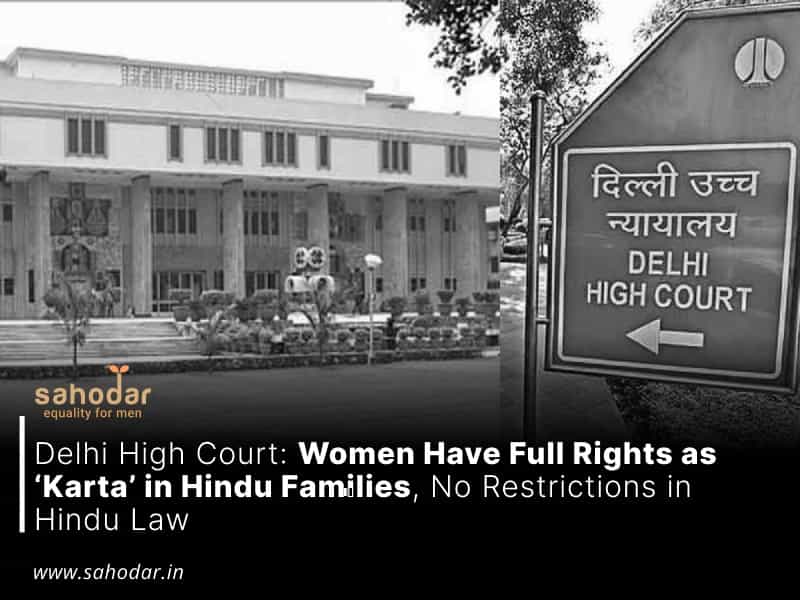The Delhi High Court has adjudicated that the entitlement of a woman to assume the position of the Karta within a Hindu Undivided Family (HUF) remains unrestricted by both legislative prescriptions and orthodox Hindu jurisprudential norms. In rendering their decision, the division bench, comprising Justice Suresh Kumar Kait and Justice Neena Bansal Krishna, underscored that societal perceptions should not serve as a rationale for the abrogation of rights expressly bestowed by legislative enactments.
“To say that a woman can be a coparcener but not a Karta, would be giving an interpretation which would not only be anomalous but also against the stated Object of introduction of Amendment [in the Hindu Succession Act, in 2005],” the court said.
Commencing the verdict with a citation from Ruth Bader Ginsburg, the former Associate Justice of the Supreme Court of the United States, the bench remarked on the prevailing reluctance to acknowledge women as Kartas, notwithstanding the conferment of equal coparcenary rights as men.
“Men and women historically were born equal. However, over a period of time, with the advancement of civilization and hierarchical division of society, women have been pigeonholed according to gender roles which progressed into an act of prelation that has relegated them to a secondary position in society,” the court said.
It added: “Similarly, the Amendment of 2005 to the Hindu Succession Act, 1956 which has conferred coparcenary rights to the women, equivalent to that of men, is a quintessence of another reform in law relating to women empowerment. However, the unwavering certitude in marginalisation of women, so deeply entrenched in Society, is perceived to be imperilled by the prospect of a woman taking the position of Karta in an HUF, a role that was traditionally assumed by men.”
The bench underscored that the explicit language of Section 6 within the 2005 Amendment Act unambiguously conveys the inclusivity of “same” rights, encompassing all coparcenal privileges, including the entitlement of a woman to assume the position of a Karta.
The court expounded that positing the proposition that a woman may function as a coparcener but is precluded from acting as a Karta would entail a construction not only incongruous but also contrary to the legislatively articulated purpose behind the Amendment.
Furthermore, the court elucidated that notwithstanding the preclusion of simultaneous Karta positions within a Hindu Undivided Family (HUF), delegation of managerial responsibilities to another coparcener remains a permissible recourse under specific circumstances.
Additionally, the court clarified that the assumption of the role of a Karta by a female coparcener does not derogate the rights of coexisting coparceners. It emphasized the continuity of their unaltered entitlements, interests, and coparcenary rights in such instances.
“If there arises any scepticism about the skills, efficiency, sincerity or ability of female Coparceners to act as the Karta or being influenced by her in-laws, the other Coparceners have adequate remedies to seek for a partition or impeach any wrongful alienation of property made by the Karta,” the court said.
The court rejected the proposition contending that the spouse of a female Karta could exert indirect influence over the affairs of her father’s family’s Hindu Undivided Family (HUF).
Terming this perspective as “parochial,” the court observed that the legislature, through Section 14 of the 1956 Act, intentionally sought to rectify such notions. This statutory provision endeavors to confer upon women the substantive entitlement to absolute ownership of their property, addressing a historically delayed recognition of this right.
“If a woman is proscribed from becoming a Karta in view of this reasoning as cited by the appellant, it will only render the legislative endeavour to give rights in immovable properties to women through Section 14 of the Act,1956 as a mere mirage. Ergo, a woman who has absolute ownership in a property cannot be denied a right to manage it on the warped reasoning that she may get influenced by her in-laws. Thus, societal apprehension and reluctance can never truncate legislative enactments to do away with patriarchal discrimination,” the court said.Top of Form
The bench expressed these observations while rejecting a petition challenging a decision by a single judge, who ruled that there is no legal constraint preventing the eldest female co-parcener of a Hindu Undivided Family (HUF) from assuming the role of its Karta.
Furthermore, the court formally designated Sujata Sharma as the Karta of the HUF named “D.R. Gupta & Sons HUF.”

